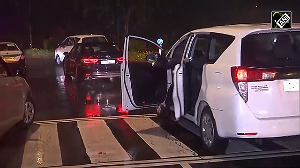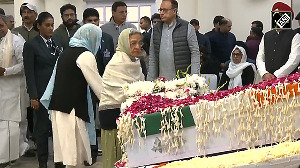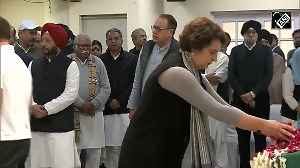German Chancellor Angela Merkel on Sunday said her country's position on the India-US nuclear deal would be in line with international opinion on the pact now being deliberated in the US Congress.
This is seen as a important shift from the earlier German position that the deal would not help the cause of non-proliferation and adversely impact the international negotiations with Iran.
"I have been assured that non-proliferation of atomic weapons is an important aspect of India's international policies and this commitment is an important one for us," she told a crowded joint press conference after a meeting with Indian Prime Minister Manmohan Singh in Hannover on Monday.
"The process, as it has been initiated in the US as well as in the Nuclear Suppliers Group, can intensify our cooperation in the peaceful use of nuclear energy. This process has not reached its conclusion, but the commitments and the statements from the Indian side on the issue of non-proliferation are to my minds important statements on this dialogue," the chancellor said.
Complete coverage: The Indo-US nuclear tango
Earlier, responding to a question on whether he had discussed the nuclear deal with Chancellor Merkel, Dr Singh said: "We also had a very useful discussion in the areas of civilian nuclear power. I mentioned to Chancellor Merkel that India stands committed to all the promises reflected in the joint statement issued by (US) President George Bush and me on July 18, 2005, and that India has a impeccable record of not contributing to proliferation. That we are a responsible nuclear power, that we have a no first use doctrine and that we have put in place export controls and other restrictions which comply with the guidelines of the Nuclear
Suppliers Group and therefore cooperation with India on civilian nuclear power will not run any risk of encouraging unauthorised proliferation."
According to Chancellor Merkel, Germany would observe the progress of how the agreement between India and the US is received by the US House of Representatives and Senate, who still have to ratify it. "We will also have a look as far as (IAEA chief) El Baradei is concerned. We found it very important in Germany that El Baradei found it a clear step forward. We will also have a close look at what the Indian prime minister said, Germany will take very seriously what was said specifically by the Indian
side, and we will recognise these as a clear commitment."
"But it is still a process, and then we will build opinion within the international community. I have the overall impression that we are on a successful or positive path. We acknowledge that the Indian side has fixed a lot more aspects than was the case earlier. And if we have questions then we will discuss it directly with each other on a friendly basis."
Earlier, in his opening remarks, Dr Singh had said that "We had a very useful discussion about our bilateral relations. We also exchanged views about regional issues and the current international situation. I believe that these have helped us reach a better understanding of each other's positions on all these issues.
Ïn the energy sector, we welcome the setting up of the high level Indo-German Energy Forum, with participation of both governments, as well as public and private sectors. The forum will enable the two countries to focus on practical cooperation in the fields of energy efficiency, clean coal technology and renewable energy."
Noting that the two countries have "long standing cooperation in the field of science and technology," he said, "We have agreed to work actively towards setting up a jointly funded Indo-German science center in Delhi.
"India and Germany share a common perspective on terrorism. India has been a victim of terrorism for mauy years now, We appreciate Germany's understanding our position and look forward to continued cooperation on counter-terrorism," the prime minister said.
"Our two countries also have a common vision of a co-operative rule based on a multi-polar world order. During our discussions, we reiterated our mutual determination to continue our efforts within the framework of the G4 for reform and expansion of the UN security council without which the overall reform of the UN will remain incomplete," he said.
"I have invited Chancellor Merkel to visit India next year for continuing the tradition of annual summit meetings, and I look forward to working with her to provide further impetus to our strategic partnership," he concluded.






 © 2024 Rediff.com -
© 2024 Rediff.com -